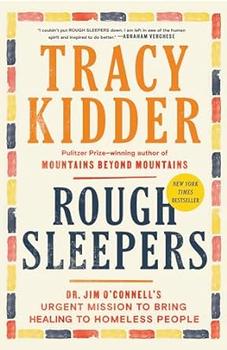Summary | Excerpt | Reviews | Beyond the book | Read-Alikes | Genres & Themes | Author Bio

Dog Lady and the Story of America's Forgotten People and Pets
by Carol MithersIn the mid-1990s, Lori Weise began working at a furniture factory near Skid Row, a blighted section of downtown Los Angeles notorious for its high rates of homelessness, poverty, and crime. Struck by the sheer number of skinny, mangy street dogs prowling the sidewalks in search of food, she and a colleague started a spay-and-neuter program and animal rescue run out of the back of the factory, an operation they dubbed "Downtown Dog Rescue." Yet as Weise soon realized, many of the loose dogs roaming the streets were not actually strays. Instead, they were pets belonging to the area's homeless population. These dogs lacked a good diet, safe shelter, and access to medical care for the same reasons their unhoused owners did. And what their owners needed was help, not blame.
As Carol Mithers recounts in Rethinking Rescue, that realization proved to be a watershed moment for Weise, inspiring two decades of tireless advocacy for pets and their owners in economically struggling areas of downtown LA. With vividly rendered accounts of the people and dogs Weise has met over the years, the book details her on-the-ground work in some of the city's poorest neighborhoods, from her early days of forging community connections with homeless pet owners in Skid Row to her pioneering intervention program at the South LA shelter that kept thousands of pets safely with their owners and helped bring about a paradigm shift in the concept of animal rescue, inspiring similar programs across the country.
Nationwide, the pets of low-income owners are the most likely to be surrendered, lost, or impounded. They are the least likely to be spayed or neutered and, because of low vaccination rates, the most likely to contract preventable diseases such as parvovirus and heartworm. Yet as Weise learned all too well from her community outreach, if poor people's pets are disproportionately likely to end up in the shelter, it's not because they're not loved. Instead, it's because their owners lack resources, information, access to services, and—most of all—money. They are the cash-strapped households who can't pay the redemption fee when their dog escapes from a broken fence and ends up in the pound. The evicted who can't find a homeless shelter that accepts dogs. The senior citizens on a fixed income who can't afford emergency surgery for a sick or injured pet and surrender it to be put down so that at least it won't suffer. The families who didn't have access to low-cost spaying services and now have a litter of unwanted puppies and a landlord who won't let them keep more than one pet.
"The humane world complained constantly about how animals lived in poorer neighborhoods, but no one asked why this was so," Mithers writes. "What were people struggling with that got in the way? How could you address their situations in a way that made change possible?" Placing her approach to animal advocacy into the context of the larger history and goals of the animal rescue movement, the book shows how Weise and Downtown Dog Rescue were the first in Los Angeles and among the first in the nation to start asking those hard questions, challenging the simplistic narrative that "bad" owners are always to blame for animal welfare problems and that a new and "better" home is always the answer. While the movement has traditionally focused all its money and effort on rescuing animals in need and rehoming them, Weise's work with Downtown Dog Rescue points to a different approach: invest some of that money and effort into providing low-income pet owners with the support they need so their animals don't end up in the shelter in the first place—whether that means paying for a pet's surgery, providing free dog training, helping owners find affordable pet-friendly housing, or covering the redemption fee at the pound and the cost of a new fence so the dog won't escape again.
While Rethinking Rescue is structured around Weise's story and personal experiences, the book also weaves in interesting discussions of broader issues relevant to animal welfare, including the problem of animal hoarding, the racial politics surrounding attitudes toward pit bulls, the biases implicit in the predominantly white and affluent world of animal rescuers, and the devastation caused by Hurricane Katrina in 2005, which killed as many as 150,000 dogs and cats—mostly those belonging to families without the resources to escape—and incontrovertibly showed the extent to which the fate of pets in the United States is tied to the race and economic status of their owners.
Overall, the book is a fascinating portrait of a remarkable animal advocate and a compelling examination of the complex ways that animal welfare issues intersect with issues of poverty, inequality, and race. Contrasting the animal rescue movement's compassion toward animals with the callous, punitive attitude all too often exhibited toward impoverished pet owners, Mithers shows how animal welfare and social justice are inextricably linked. "Keeping people off the street and pets out of shelters is part of the same fight," as she puts it.
But while there is plenty that is inspirational in Rethinking Rescue, it is also a depressing reminder of the limits of what can be achieved by even such a committed and visionary advocate as Weise. "I admire Lori for being willing to do things on the front lines that many of us don't have the soul for," Mithers quotes Aimee Gilbreath, executive director of the Michelson Found Animals Foundation, as saying. "But animal welfare can't solve poverty. Support programs can't solve poverty… [T]his is not going to go away until we deal with income inequality."
![]() This review
first ran in the August 21, 2024
issue of BookBrowse Recommends.
This review
first ran in the August 21, 2024
issue of BookBrowse Recommends.

If you liked Rethinking Rescue, try these:

by Tracy Kidder
Published 2024
The powerful story of an inspiring doctor who made a difference, by helping to create a program to care for Boston's homeless community—by the Pulitzer Prize–winning, New York Times bestselling author of Mountains Beyond Mountains

by Janice P. Nimura
Published 2022
Elizabeth Blackwell believed from an early age that she was destined for a mission beyond the scope of "ordinary" womanhood.
Your guide toexceptional books
BookBrowse seeks out and recommends the best in contemporary fiction and nonfiction—books that not only engage and entertain but also deepen our understanding of ourselves and the world around us.